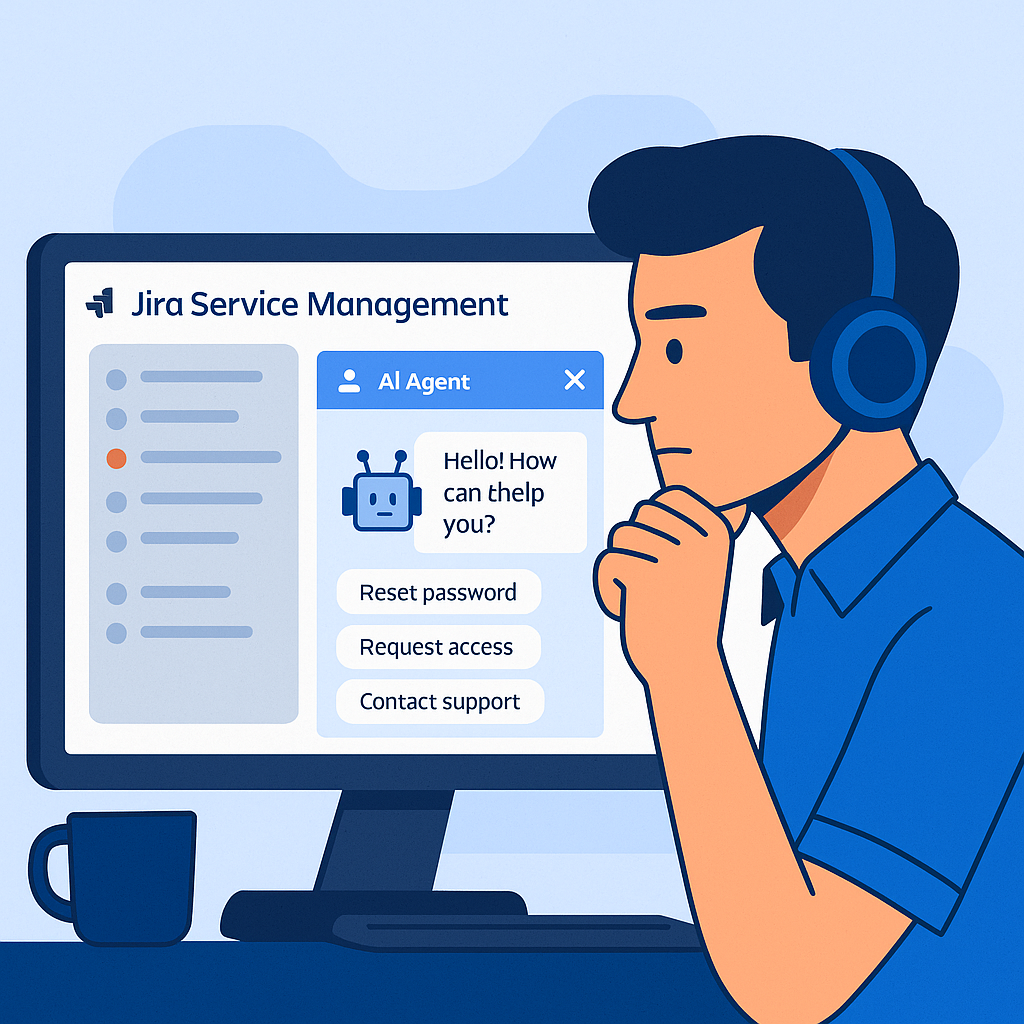How to Use AI Agents in Jira Service Management

Introduction
In the age of digital transformation, support teams are under constant pressure to deliver faster, more accurate, and more human-like service — all while reducing costs. That's where AI agents in Jira Service Management (JSM) come in.
AI agents, sometimes called virtual agents, are smart assistants that handle repetitive support requests, suggest knowledge articles, and even automate complex workflows. They don’t just improve efficiency — they also help scale support without scaling the headcount.
What Are AI Agents?
AI agents are software bots powered by natural language processing (NLP) and machine learning (ML). In JSM, they:
- Understand user intent from chat or ticket input
- Search for relevant knowledge base articles
- Auto-reply or route tickets to the right team
- Trigger workflows or automations
- Learn from past interactions to improve responses over time
These agents can be built using Atlassian tools, Marketplace apps, or integrated third-party AI platforms.
Use Cases in Jira Service Management
🧑💻 IT Support
- Automatically respond to "How do I reset my password?" type questions.
- Route tickets based on urgency or keywords (e.g., VPN issue → Network team).
- Surface known incident updates to reduce duplicate tickets.
🧾 HR & Internal Services
- Handle common HR requests (e.g., leave policy, benefits).
- Create onboarding checklists triggered by new hire requests.
- Guide employees through workflows (e.g., "How to request parental leave").
📞 Customer Support
- Deliver 24/7 responses to frequently asked questions.
- Translate requests in real-time for multilingual teams.
- Escalate high-priority or frustrated customer tickets based on sentiment.
How to Get Started
1. Enable Atlassian Virtual Agent (Premium plans)
In 2024, Atlassian released its Virtual Agent for JSM Premium and Enterprise tiers. It’s powered by Atlassian Intelligence and integrates directly into the Jira Help Center and Slack.
Features include:
- Natural language chat in Slack or portal
- Knowledge base integration with Confluence
- Custom conversation flows with fallback to human agents
You can configure behavior, monitor performance, and review agent training data in the JSM admin panel.
2. Use Marketplace Apps
Some leading apps to explore:
- Kona AI for Jira: Chatbot with AI training and multilingual support.
- Stiltsoft AI Assistant: Smart responses, summaries, and automations.
- Qatalog: Intelligent service directory and virtual agent for internal teams.
3. Build Your Own AI Agent
If you have custom needs:
- Use Forge (Atlassian’s serverless dev platform) to build native Jira apps.
- Connect to OpenAI, AWS Bedrock, or Google Vertex AI for NLP.
- Store logic and workflows in external services (e.g., Zapier, Make, n8n).
You can configure the agent to call JSM APIs, read ticket data, and respond dynamically.
Best Practices
- Start with FAQ automation. Quick wins build trust and reduce noise.
- Don’t pretend it’s human. Be transparent that it’s a virtual assistant.
- Train regularly. Monitor what it can’t answer and adjust workflows.
- Give fallback options. Let users escalate to a human anytime.
Conclusion
AI agents in Jira Service Management are not about replacing people — they’re about freeing them to focus on higher-value work. Whether you're managing IT, HR, or customer operations, adding AI to your service desk can significantly enhance speed, consistency, and satisfaction.
Start small. Automate the obvious. Then let your AI agent grow smarter over time.
Need help integrating AI into Jira Service Management?
📩 Contact us for a consultation.